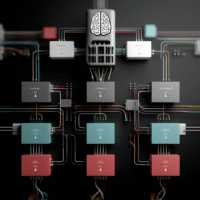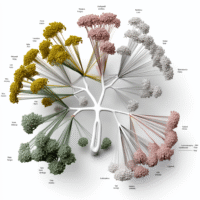Vladimir Dyachkov PhD
-
Google AI’s Innovative Machine Learning Algorithms for Privacy-Preserving Data Analysis
Understanding the Target Audience for Google’s Novel Machine Learning Algorithms Google’s innovative machine learning algorithms, particularly those focused on differentially private partition selection, cater to a diverse audience. This includes data scientists and machine learning engineers in sectors like healthcare, finance, and social media, where user privacy is paramount. Business managers and decision-makers also benefit […] ➡️➡️➡️
-
Native RAG vs. Agentic RAG: Enhancing Enterprise AI Decision-Making for Business Leaders
In the rapidly evolving landscape of artificial intelligence, businesses are constantly seeking ways to enhance decision-making processes. A significant development in this field is the concept of Retrieval-Augmented Generation (RAG), which has two primary approaches: Native RAG and Agentic RAG. Understanding these methodologies is crucial for business leaders, AI practitioners, and decision-makers aiming to leverage […] ➡️➡️➡️
-
Huawei CloudMatrix: Revolutionizing AI Datacenters for Efficient LLM Serving
Understanding the Target Audience for Huawei CloudMatrix The target audience for Huawei CloudMatrix consists of AI researchers, data scientists, IT managers, and technology business leaders. These professionals are often tasked with deploying large-scale machine learning models, necessitating a robust infrastructure for efficient operations. Pain Points Several issues challenge these professionals: Scalability: Traditional datacenter architectures struggle […] ➡️➡️➡️
-
AmbiGraph-Eval: Enhancing Graph Query Generation for Researchers and Data Scientists
Understanding AmbiGraph-Eval and Its Impact on Graph Query Generation The introduction of AmbiGraph-Eval marks a significant step forward for professionals who rely on graph databases and natural language processing (NLP). The target audience includes researchers, data scientists, and business analysts aiming to improve the way they interact with data. Understanding the pain points and goals […] ➡️➡️➡️
-
Top 10 AI Blogs for Developers and Engineers to Follow in 2025
Staying Updated in AI: Essential Blogs and News Websites For AI developers and engineers, keeping pace with the rapid advancements in artificial intelligence is crucial. As the field evolves, so do the tools and techniques that shape it. Here’s a rundown of the top blogs and news platforms that provide valuable insights, practical tips, and […] ➡️➡️➡️
-
Zhipu AI Launches ComputerRL: Revolutionizing Reinforcement Learning for Desktop Agents
The Rise of the AI Agent: Understanding ComputerRL In the world of artificial intelligence, the development of agents that can maneuver through complex digital environments has become a hot topic. One groundbreaking innovation in this field is Zhipu AI’s ComputerRL, a framework that redefines how computer agents interact with applications and user interfaces. By bridging […] ➡️➡️➡️
-
Google Launches Mangle: A Game-Changer for Developers and Security Professionals in Deductive Database Programming
Understanding the Target Audience for Mangle The release of Mangle, an open-source programming language for deductive database programming by Google, is primarily tailored for developers, site reliability engineers (SREs), and security professionals. These audiences currently handle significant challenges related to data fragmentation across various sources, which complicates tasks such as querying, analyzing, and reasoning about […] ➡️➡️➡️
-
Top 9 Speaker Diarization Libraries and APIs for Technical Professionals in 2025
Understanding Speaker Diarization Speaker diarization is a crucial technology that helps us understand audio recordings by identifying “who spoke when.” This process is especially important in various fields such as call centers, legal proceedings, healthcare, and media. By segmenting an audio stream and labeling each segment by speaker identity, diarization enhances the clarity of transcripts […] ➡️➡️➡️
-
NVIDIA Streaming Sortformer: Real-Time Speaker Diarization for Enhanced Meeting Productivity
Understanding NVIDIA’s Streaming Sortformer NVIDIA’s Streaming Sortformer is a groundbreaking tool designed to enhance real-time speaker diarization. This technology is particularly valuable for professionals in various fields, including AI managers, content creators, digital marketers, and business professionals. These individuals often face challenges in accurately capturing and analyzing conversations with multiple speakers, especially in noisy environments. […] ➡️➡️➡️
-
Discover DeepSeek-V3.1: The Cost-Effective AI Language Model Transforming Research and Development
What is DeepSeek-V3.1 and Why is Everyone Talking About It? The Chinese AI startup DeepSeek has recently launched DeepSeek-V3.1, its latest flagship language model. This model builds on the architecture of its predecessor, DeepSeek-V3, and introduces significant enhancements in reasoning, tool use, and coding performance. DeepSeek models have gained a reputation for delivering performance comparable […] ➡️➡️➡️
-
Transform Research Papers into Production-Ready Code with DeepCode: A Game Changer for Researchers and Developers
Understanding the Target Audience DeepCode is designed for a diverse group of users, primarily researchers, software engineers, and academic professionals. These individuals often face significant challenges when translating complex research into functional software. Common pain points include: Time-consuming manual coding processes from research papers. Lack of reproducibility in research implementations. Difficulty in quickly prototyping software […] ➡️➡️➡️
-
South Korea’s Leading AI Models: Innovations in Language Technology
South Korea is emerging as a significant player in the field of large language models (LLMs), thanks to a combination of government support, corporate innovation, and academic research. This strategic focus not only aims to reduce reliance on foreign technologies but also enhances data privacy and fosters advancements in critical sectors such as healthcare, education, […] ➡️➡️➡️
-
Liquid AI Launches LFM2-VL: Fast Vision-Language Models for Developers and Enterprises
Introduction to LFM2-VL Liquid AI has made a significant leap in the field of artificial intelligence with the release of LFM2-VL, a new family of vision-language foundation models. These models are tailored for low-latency and device-aware deployment, making them suitable for various devices such as smartphones, laptops, and wearables. With two variants, LFM2-VL-450M and LFM2-VL-1.6B, […] ➡️➡️➡️
-
ZenFlow: Revolutionizing LLM Training with Stall-Free Offloading for AI Developers
Introduction to ZenFlow In the world of large language model (LLM) training, efficiency is key. The introduction of ZenFlow by the DeepSpeed team is set to revolutionize the way we handle GPU resources. Traditionally, training models has come with various bottlenecks, especially when it comes to CPU-induced stalls. For example, fine-tuning a model like Llama […] ➡️➡️➡️
-
PyTorch vs TensorFlow: The Ultimate Deep Learning Framework Comparison for 2025
Deep Learning Framework Showdown: PyTorch vs TensorFlow in 2025 The choice between PyTorch and TensorFlow remains one of the most debated decisions in AI development. Both frameworks have evolved dramatically since their inception, converging in some areas while maintaining distinct strengths. This article explores the latest patterns from a comprehensive survey paper from Alfaisal University, […] ➡️➡️➡️
-
Google AI Launches 5 New Agents to Transform Developer Workflows
Introduction to Google AI’s New Agents Google Cloud has recently introduced five innovative AI agents aimed at enhancing developer workflows. These tools are designed to reduce manual tasks, speed up data analysis, and simplify automation processes. Each agent targets specific challenges faced by developers, from managing data pipelines to improving GitHub repository handling. Let’s delve […] ➡️➡️➡️
-
Migrating to Model Context Protocol (MCP): A Step-by-Step Guide for Developers and Architects
Understanding the Target Audience The target audience for this playbook includes architects, developers, and business managers involved in AI integrations. These professionals often face challenges such as: Difficulty managing and maintaining custom integrations High technical debt due to brittle code Challenges in achieving interoperability between systems The need for scalable, flexible solutions that reduce integration […] ➡️➡️➡️
-
Unlock Excel’s Potential: Discover the Game-Changing =COPILOT() Function for Enhanced Data Analysis
Understanding the COPILOT Function in Excel Excel has taken a major leap forward with the introduction of the COPILOT function. This feature allows users to interact with their data using natural language, making complex tasks simpler and more intuitive. By leveraging artificial intelligence, COPILOT can analyze, summarize, and even generate new data based on user […] ➡️➡️➡️
-
Unlocking Reliable LLM Evaluation: Boost AI Decision-Making with Signal-to-Noise Insights
Understanding Signal and Noise in LLM Evaluation What is Signal? Signal measures how well a benchmark can differentiate between better and worse models. High signal implies distinct performances across different models, allowing for clear rankings. Conversely, a low signal results in closely clustered scores, making it hard to determine which model excels. What is Noise? […] ➡️➡️➡️
-
Build a Self-Hosted LLM Workflow with Ollama, REST API, and Gradio
Understanding the Target Audience The tutorial on building a self-hosted LLM workflow with Ollama, REST API, and Gradio Chat Interface is tailored for a diverse audience. Key groups include: Data Scientists and AI Practitioners: These individuals are eager to implement machine learning models in real-world applications. Software Developers: Developers looking to integrate AI capabilities into […] ➡️➡️➡️



















